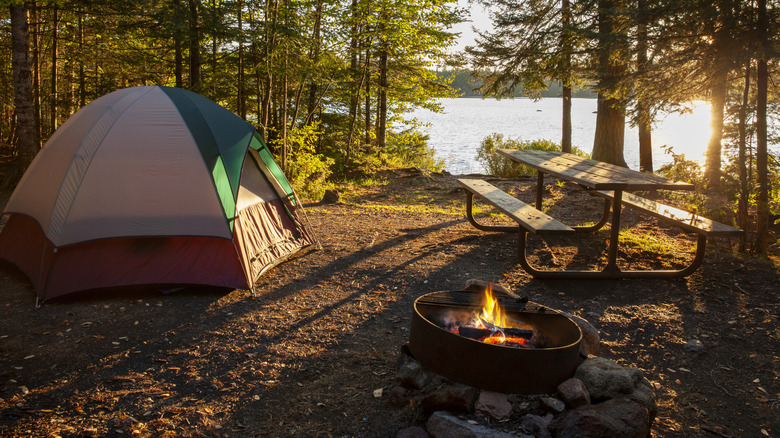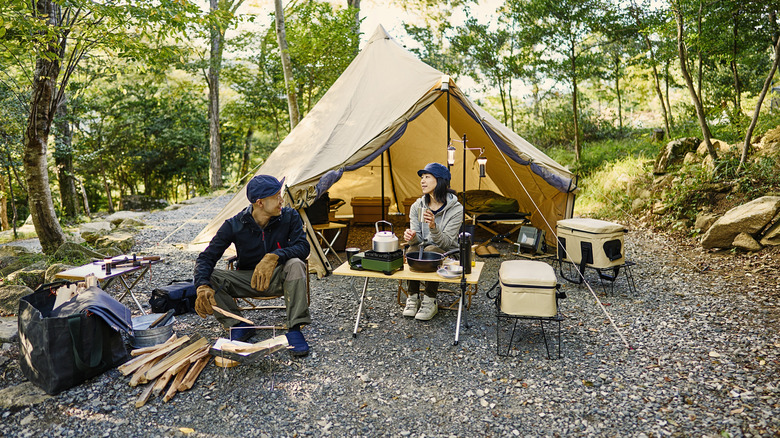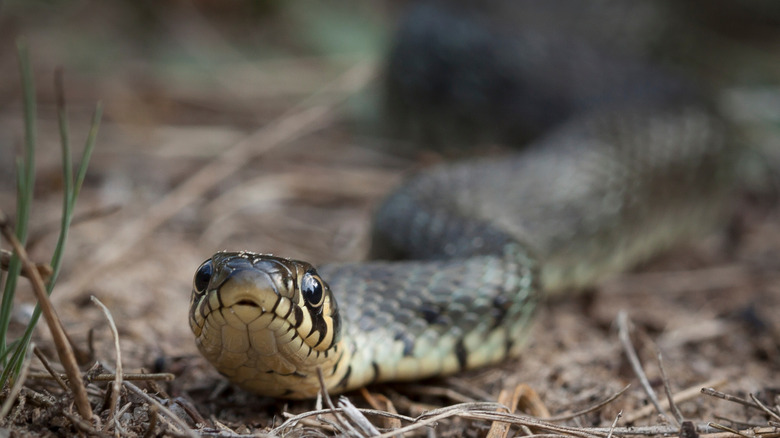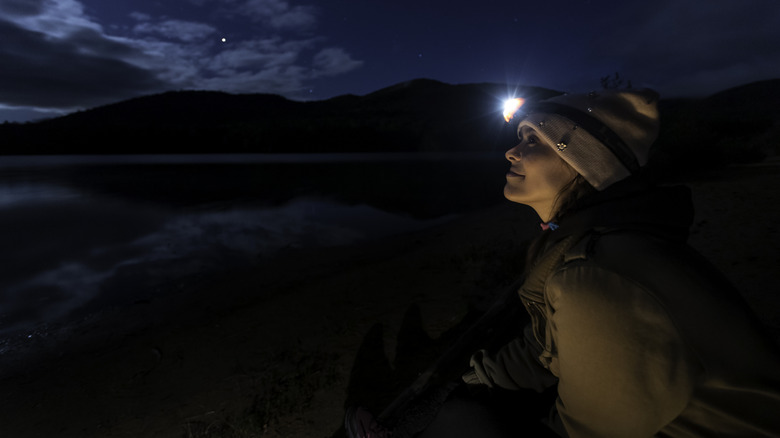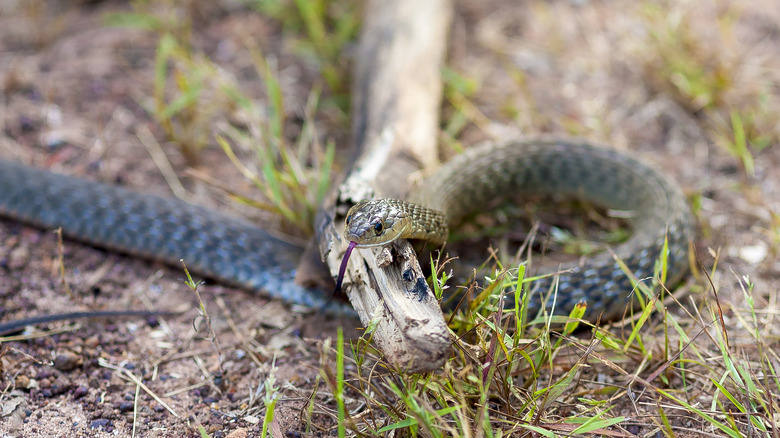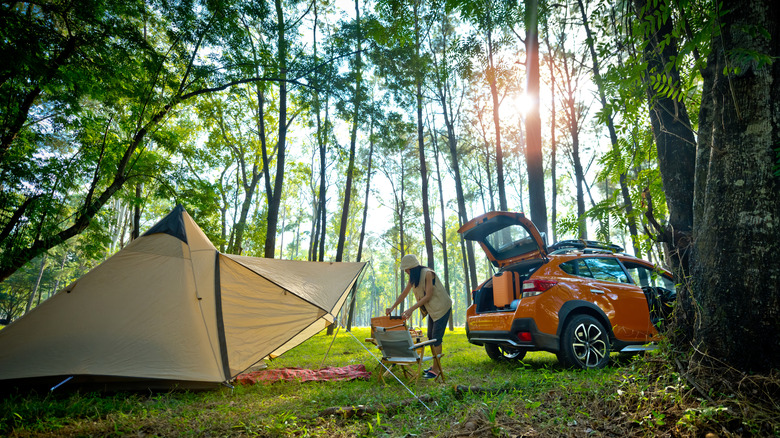Keep Your Campsite Snake-Free With These Easy Tips
When relaxing on a camping trip, the last thing you want is a snake encounter. While the idea of a snake sneaking into your campsite might sound unsettling, it's a real risk in certain environments. Snakes are often attracted to places that offer shelter and food, which makes a campsite a prime spot for them to explore. Understanding how to keep your campsite free from these slithering visitors is essential for a safe and enjoyable experience.
Snakes typically avoid human interaction, but they may venture into your campsite if they feel there's an opportunity for food or shelter. While they can be beneficial to the ecosystem by controlling rodent populations, snakes can also pose a danger, especially venomous species. Preventing snake encounters is more than just a matter of fear; it's about safeguarding your camp, pets, and family from potential harm. Taking a few simple actions can make your campsite less attractive to snakes and increase your chances of a safe camping trip.
With a bit of forethought and effort, you can make your campsite unappealing to these creatures. The goal is not only to avoid a potentially scary situation but also to ensure that you and your loved ones can enjoy the outdoors without worrying about snakes. Let's explore how to create a snake-free zone in your campsite.
Use the right campsite location to prevent snakes
One of the best ways to keep your campsite snake-free is to choose the right location from the start. Snakes prefer areas with dense vegetation, rocky terrains, or locations close to water sources, as these environments offer food and shelter. Avoid camping directly near tall grass, piles of rocks, or woodpiles – all common hiding spots for snakes. When selecting your campsite, look for open, well-lit spaces with minimal ground cover.
It's also important to consider the time of year and region where you're camping. Snakes are more active during warmer months and in areas where they're naturally abundant. Research local wildlife beforehand to know what to expect and whether snakes in the region are venomous. By setting up camp in an area less likely to attract snakes, you can significantly reduce the risk of an encounter.
Additionally, keep your campsite clear of pathways that snakes might naturally use, such as those leading to water sources. Snakes often follow scent trails to find prey or shelter, so setting up camp off these routes makes your area less appealing. By starting with the right location, you'll have a strong foundation for keeping your campsite snake-free.
Make noises that snakes can hear
Snakes are highly sensitive to vibrations, which can work to your advantage when trying to keep them away. One effective way to ensure they steer clear of your campsite is by creating noise. Vibrations, such as stomping, signal to snakes that larger creatures are nearby, prompting them to retreat.
When hiking near your campsite, use tools like trekking poles to tap the ground ahead of you, especially in areas with tall grass or dense foliage. This strategy can be particularly helpful during dusk or early morning when snakes are most active. By alerting them to your presence, you minimize the risk of a surprise encounter.
Noise can also serve as a preventative measure in camp. Periodically move around your site, particularly near places like fire pits, tents, or stored supplies, where snakes might hide. This consistent activity makes your campsite less appealing as a resting spot for these creatures. Combining sound with other tactics ensures your campsite remains uninviting to snakes.
Limit lighting and minimize nocturnal snake risks
Although light is a useful tool for visibility, too much artificial lighting at night can attract insects, which, in turn, can draw smaller animals that snakes prey on. Instead of flooding your campsite with bright lights, opt for targeted illumination, like headlamps or motion-activated lights, to maintain visibility without encouraging an influx of prey species.
Another crucial nocturnal measure is securing your sleeping area. Keep your tent zipped at all times, and ensure that there are no gaps where snakes could enter. Place your tent on a clean, flat surface free from vegetation to further deter snakes. If you're using hammocks or sleeping bags outside, check the area thoroughly before settling down for the night.
Snakes are cold-blooded creatures, and they may be drawn to the residual warmth of a campfire. Avoid sleeping directly next to the fire pit or leaving the embers glowing unattended overnight. Simple adjustments to your nighttime setup can significantly reduce the risk of attracting snakes while you rest.
Keep rodents at bay to minimize snake attraction
One of the main reasons snakes are drawn to campsites is the abundance of food, specifically rodents. If your campsite has a rodent problem, you're more likely to attract snakes as well. Keeping rodents at bay is crucial in reducing the likelihood of snakes invading your campsite. Start by securing your food in sealed containers. Rodents are often attracted to food scraps or improperly stored items, so by managing your food supply, you eliminate one of the main reasons snakes are drawn to the area.
It's also a good idea to clean up after cooking or eating. Don't leave any food remnants behind, as they could attract rodents. Pay attention to where you store your food overnight, and avoid leaving it out in the open. This not only keeps the snakes away but also ensures that you don't have a rodent problem on your hands in the first place.
Taking these precautions means your campsite is less likely to draw the creatures that snakes prey on. By addressing the rodent issue, you're eliminating one of the primary factors that might lead to snake activity in the area. It's a simple yet effective way to help keep your campsite safe from unwanted slithery guests.
Use repellents and barriers as added protection
For an extra layer of protection, consider using snake repellents and physical barriers around your campsite. Natural repellents like sulfur or clove oil can deter snakes when sprinkled around the perimeter of your site. Alternatively, there are commercial snake repellent sprays available that are safe for outdoor use. Apply these products carefully, following the instructions, to avoid affecting other wildlife.
Physical barriers can also keep snakes out. If you're camping in an area known for snake activity, create a temporary snake-proof barrier using materials like fine mesh. Set the barrier several inches high and ensure it's securely anchored to the ground. While it requires some effort, this can be particularly useful for longer camping trips in snake-prone regions.
Lastly, inspect your campsite regularly for signs of snake activity. Tracks, shed skins, or unusual disturbances may indicate that a snake has been nearby. Staying vigilant and prepared ensures your campsite remains snake-free while giving you peace of mind.
